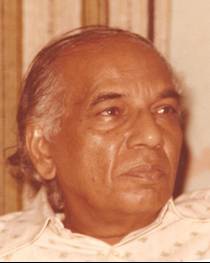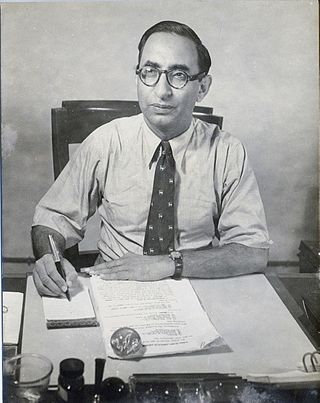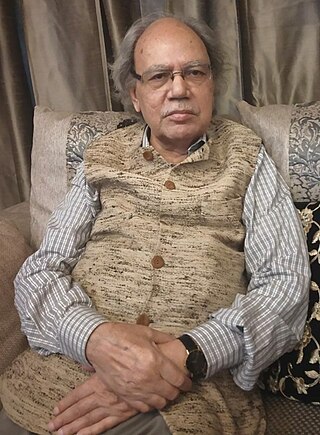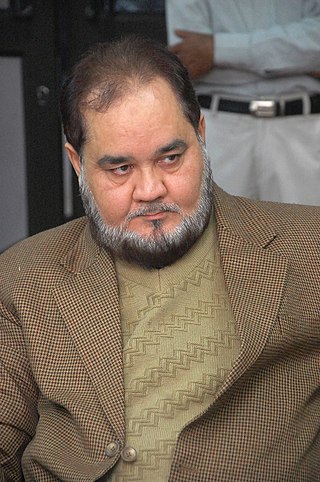Related Research Articles
Altaf Fatima was a Pakistani Urdu novelist, short story writer, and teacher. Altaf Fatima was born in Lucknow, she moved to Lahore during the Partition, earning MA and BEd from the University of Punjab. Her novel Dastak Na Do is regarded as one of the defining works in the Urdu language. An adaptation was presented on Pakistan television and an abridged translation was serialised by the Karachi monthly, Herald. In 2018, Fatima received the KLF Urdu Literature award at the 9th Karachi Literature Festival for her book, Deed Wadeed. She died on 29 November 2018.

Mir Babar Ali Anees, also known as Mir Anees was an Indian Urdu poet. He used his pen-name (takhallus) of Anees in poetry. Anees used Persian, Urdu, Arabic, and Sanskrit words in his poetry. Anis wrote prolonged Marsias, which was a custom of his times, but nowadays only selected sections are narrated even in religious ceremonies. He died in 1291 Hijra, corresponding with 1874 CE.
Khurshid Rizvi is a Pakistani scholar of languages and an Urdu poet.
Dilawar Figar, was a Pakistani humorist and poet. He was known as Shehansha-e-Zarafat and Akbar-e-Sani for his satire and humour.
Muhammad Abul Khair Kashfi was a Pakistani author, researcher, critic, linguist and scholar of Urdu literature and linguistics.

Gopi Chand Narang was an Indian theorist, literary critic, and scholar who wrote in Urdu and English. His Urdu literary criticism incorporated a range of modern theoretical frameworks including stylistics, structuralism, post-structuralism, and Eastern poetics.
Moinuddin Aqeel is an author, critic being a scholar of Urdu literature and [from Pakistan, who served the University of Karachi as Professor and chairman of Urdu department. He also remained Director of the Bureau of Composition, Compilation and Translation, University of Karachi. Besides University of Karachi, Dr. Aqeel taught Urdu at the Tokyo University of Foreign Studies, Japan and University of Oriental Studies, Naples, Italy for several years. He also gave weekly extension lectures at the Daito Bunka University, Saitama, Japan on Pakistan's culture and history. He is currently Dean of the Faculty of Languages and Literature and has served as Chairman of the Department of Urdu at International Islamic University, Islamabad.

Amjad Islam Amjad, PP, Sitara-e-Imtiaz was a Pakistani Urdu poet, screenwriter, playwright and lyricist.

Syed Ali Jawad Zaidi was an Indian Urdu poet, scholar, and author of over 80 books in several languages. He was also an Indian independence activist, lawyer and later, a civil servant, but is best known for his work in Urdu literature.
Mirza Salaamat Ali Dabeer, (29 August 1803 – 6 March 1875) was an Urdu poet who excelled and perfected the art of Marsiya writing. He is considered the leading exponent of Marsiya Nigari or marsiya writing along with Mir Anees.
Saadat Saeed is a professor of Urdu language and literature at Government College University, Lahore and contemporary critic and poet of Urdu language.
Abul Lais Siddiqui was a Pakistani author, researcher, critic, linguist and scholar of Urdu literature and linguistics.
Ahmad Siddiq, better known by his pen name Majnun Gorakhpuri, was an Urdu short story (Afsana) writer, poet and literary critic.
Mirza Rafiuddin 'Raz' Baig is a Pakistani poet. He published his first volume of poetry Deeda-e-Khush Khwab in 1988 and followed it with Beenai (Sight), Pairahan-e-Fikr, Roshni Kay Khad-o-Khaal and Abhi Darya Main Pani Hai,
Haider Qureshi ,Qureshi Ghulam Haider Arshad born on 1 September 1953 in Rabwah, Punjab, He is a Pakistani Urdu poet, short story writer, essayist, critic, editor and journalist. He writes in Urdu.

Idris Azad born on 7 August 1969, is an author, philosopher, novelist, poet, dramatist and columnist. He has written several books on fiction, journalism, critic, poetry, philosophy, mysticism and art. He is teacher of logic and philosophy at International Islamic University, Islamabad. Idrees Azad is also associated with Pakistan Film Industry. He is Head of the Department of VFX & CGI at Paragon Academy of Performing Arts, Shabab Noor Studio, Lahore and assists the director Syed Noor in film making as well.

Sheikh Muhammad Ikram better known as S. M. Ikram, was a Pakistani historian, biographer, and littérateur. He was member of the Indian Civil Service. In 1947, when Pakistan emerged from British India, Ikram opted for Pakistan and served in the Civil Service of Pakistan. On July 1, 1966, he was appointed as director, Institute of Islamic Culture, Lahore, a position he occupied until his death in 1973, at the age of sixty-four.
Dr Akhtar Husain also known as Dr Akhtar Husain Raipuri was a Pakistani scholar, journalist and lexicographer. He is also the author of the book The Dust of the Road: A Translation of Gard-e-Raah that was translated into English many years after his death.

Shamim Hanafi was an Indian Urdu critic, dramatist and a proponent of modernist movement in Urdu literature. His books on modernism include The Philosophical Foundation of Modernism and New Poetic Tradition. He was associated with the Jamia Millia Islamia to the extent of becoming a professor emeritus.

Syed Muhammad Ashraf is a Retd. Civil Servant (IRS) and an Urdu novelist and short-story writer of distinction. He is first person to qualify civil service examination in Urdu language in India. He has written novels and several collections of short stories. Some of his stories have been translated into English and other languages. He has received the Sahitya Academy Award in 2004 and Aalmi Farogh-e-Urdu Adab Award by Majlis-e-Farogh-e-Urdu Qatar in 2018.
References
- ↑ Naqvi, Sumera S. (1 August 2004). "AUTHOR: Razi Abedi: Man of two languages". Dawn. Retrieved 22 January 2010.[ dead link ]
- ↑ ‘Romanticism was responsible for rise of individualism’ Archived 14 April 2008 at the Wayback Machine 1 July 2006 Daily Times